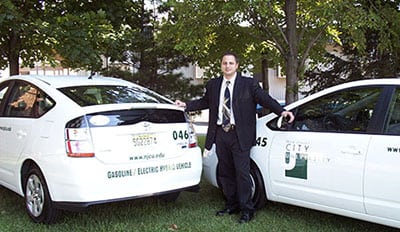 Federal recommendations and better fuel efficiency prompted New Jersey City University’s fleet management team to pursue the addition of hybrid vehicles. As the fleet continues to age, older vehicles will continue to be replaced with more environmentally friendly units.
Federal recommendations and better fuel efficiency prompted New Jersey City University’s fleet management team to pursue the addition of hybrid vehicles. As the fleet continues to age, older vehicles will continue to be replaced with more environmentally friendly units.
New Jersey City University began considering the addition of environmentally friendly vehicles for its fleet in 2001, but the plan was derailed by state budget cuts.
Fortunately, the research and knowl edge that had been gained was put to use in 2003 with the purchase of two Toyota Prius Gasoline/Electric Hybrid Vehicles.
This transition to hybrid vehicles was sparked by the Energy Policy Act (EPAct), which mandated that fleets begin purchasing alternative fuel vehicles.
Meetings with GM Fleet, Ford Fleet, American Honda, Public Service Electric & Gas, and Fuel Maker helped the department of Facilities and Construction Management determine costs for the vehicles, training, tools, and shop updates.
The advantages to the Toyota Prius Hybrid were its fuel efficiency and avail ability on New Jersey State contract. Several other state agencies had already pur chased these vehicles and NJCU was eligible for a $4,000 rebate per vehicle from the New Jersey Board of Public Utilities’ New Jersey Alternative Fuel Re bate Program.
In addition to the standard university logo and Website decals, the two new vehicles also display a rear decal that states, “Gasoline/Electric Hybrid Vehicle.” This has caught many people’s attention and prompted questions regarding how the vehicles work.
To more fully explain the features, Toyota sent a representative to NJCU to conduct emergency response training as well as hosted a three-day training course on the hybrid system at the Toyota Train ing Center in West Caldwell, N.J.
Lessons Learned
Even though the warranty on the hybrid system is 96 months or 100,000 miles, fleet managers should ensure that technicians are properly trained to work with the high voltage systems when doing in-house maintenance.
For example, a no-start condition on a regular vehicle makes a technician look for a dead battery or fuel problems. How ever, hybrid vehicles are not equipped with a standard starter and jump-starting these vehicles really only provides power to the onboard computer.
In turn, the computer starts the hybrid system and runs the IC engine to recharge the batteries. A technician who does not follow the proper diagnostic procedures could be in for the shock of his life!
NJCU plans to continue adding more hybrid vehicles to its fleet, but availabili ty shortages have caused some concern. The Toyota Prius Hybrid is no longer on state contract in New Jersey and Toyota has announced that fleet deliveries may be delayed until 2006 due to high de mand from regular consumers.
Patrick Bartole, CAFM is the fleet manager at the Department of Facilities and Construction Management for New Jersey City University. He can be reached at pbartole@njcu.edu.
